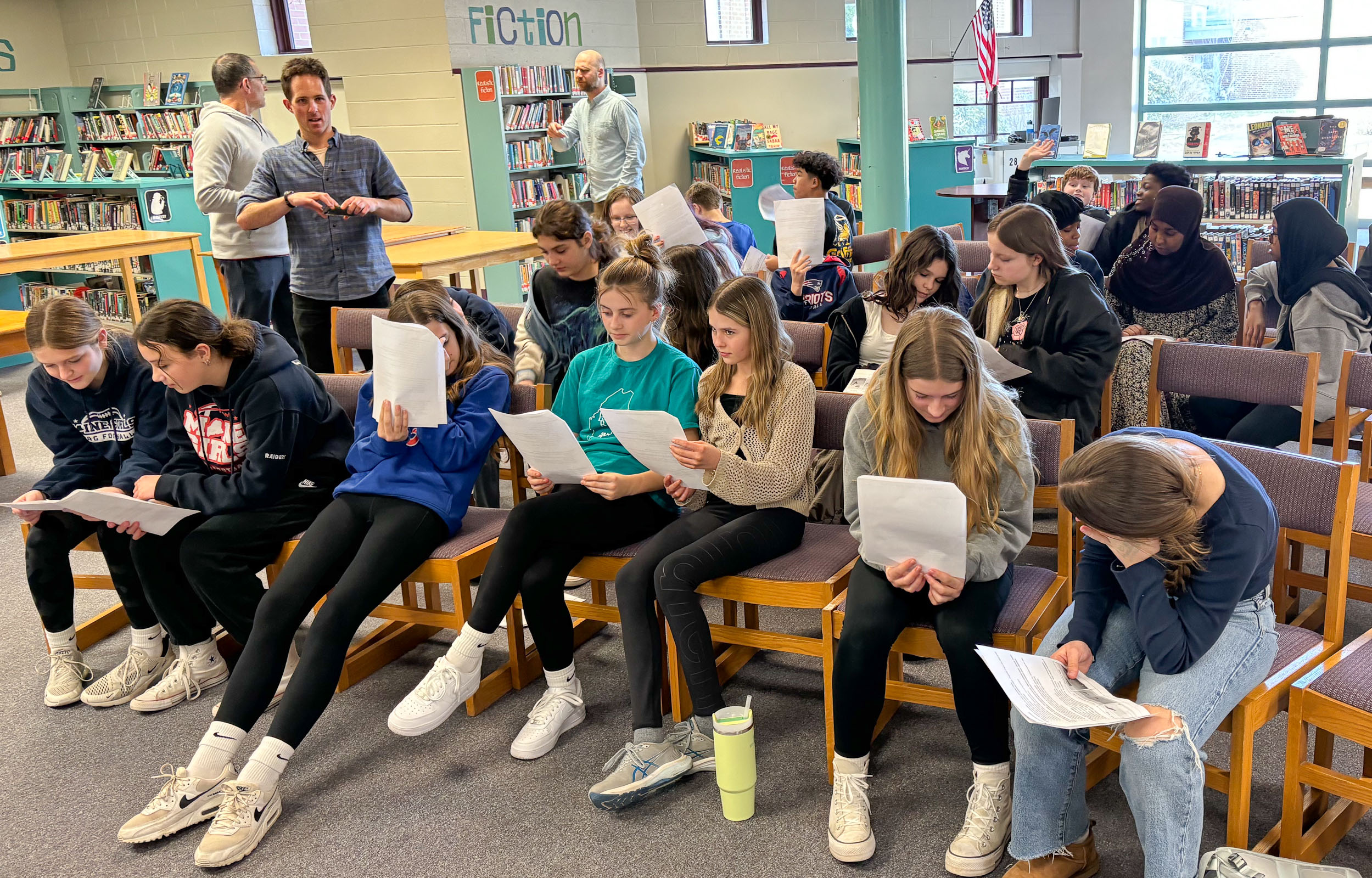It’s time for an update on what One Fish Foundation has been up to and what’s in store for the rest of the year.
These reflections serve as much a reminder of what we have yet to accomplish as what we’ve already accomplished. And there’s no question we have plenty of work still to do to get more people thinking about supporting local, responsibly-managed seafood systems.
Let’s start with some cumulative statistics.
In the classroom
Since One Fish Foundation’s launch in 2015 (we celebrate our 9th birthday in August!), we’ve had engaged, interactive discussions with nearly 3,000 students ranging from elementary ages to graduate-level classes from Maine to California. But the reality is convincing teachers that this type of content will benefit their students takes more than an email. We insist on having a conversation with teachers to understand where students are in their curriculum so we can best map the content to the students. That way, we can effectively relate the content to the students so they’ll learn why they should care about their relationship to seafood, whether they eat it or not.
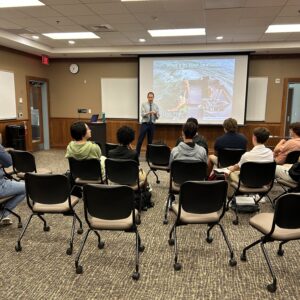
Colles teaching Honors Bio at his alma mater in Virginia April 2024. Photo Eric Hicks
Better than 90% of our class engagements have come from word of mouth. In fact, once we’ve built a relationship with a teacher and have spoken with that teacher’s students, that teacher asks us to return the following year about 95% of the time.
For props, we’ve used lobster traps, trawl net, 24-ounce jigs and a turtle excluder device. We’ve also used live green crabs and mackerel, and dead black sea bass. Nothing screams hands-on education like passing around a dead fish. Trust me, most students really did, and they did so with enthusiasm.
Conversations have ranged from whether lobsters are able to escape a trap after they’ve had their fill of bait (they can), to whether global finfish aquaculture operations can deliver on their promise of “feeding the world” (they can’t, so far).
For elementary students, we provide a storyline of how seafood gets from the ocean to their plates. We talk about different harvest methods and why effective fisheries management matters. We talk about how their decisions can have an impact on seafood and on marine ecosystems.
In middle school, we talk about wild harvest and aquaculture methods and the ecological impacts associated with each. We discuss some of the climate impacts on fisheries and the impact on what seafood is locally available. We dig into our collective relationship to seafood and explore how students can own that relationship by figuring out what seafood with values means to them.
High school students dive into complex domestic and global seafood production and consumption dynamics, and how that shapes local, regional, national, and international seafood markets. We discuss climate impacts on fisheries, such as the impact of European green crabs on fried clam availability and skyrocket prices.
We walk college students through the intersection of climate, policy and markets and how that intersection filters our lens for seafood with values. We explore complicated issues such as how corporate consolidation in the seafood industry has affected third- and fourth-generation fisherfolk in coastal communities across the country. We discuss how catch shares, the prevailing fisheries policy in the U.S. that treats access to fisheries like Wall Street stocks, contributes to that consolidation, often forcing small-scale, community fisherfolk out of business and limiting what local seafood is locally available.
Above all, we empower students to ask the right questions (Where does it come from? How was it caught?) to learn the story of the seafood they eat.
In the community
We have hosted or co-hosted more than 15 KNOW FISH Dinners in communities from New England to New Orleans and California. We make direct connections between the community and local fisherfolk as attendees hear the story of the seafood they’re eating from the fisherman who caught it (sometimes one fish at a time, sometimes more!) and the chef who prepared it.
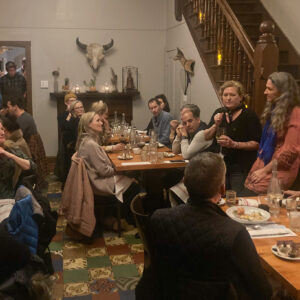
Chef Sonya Cote (left) and Sarah Ecolano of Copper River Fish Market discuss direct seafood sourcing at a KNOW FISH Dinner at Storehouse Market + Eatery in Bastrop, Texas in Feb. 2023. Photo: Mara Welton.
We’ve also participated in a variety of events aimed at engaging communities in seafood with values conversations, including Seafood Throwdowns, where local chefs compete using locally sourced seafood and ingredients and audience members get to vote on the best dish.
In Partnerships
We have collaborated closely with organizations like Slow Fish North America, Slow Food USA, North American Marine Alliance and Don’t Cage Our Oceans to elevate the conversation about seafood with values via various formats.
For example, the Rising Tide Program is a collaboration with Slow Fish and Slow Food to bring Slow Fish values of good, clean, fair seafood to Slow Food communities across the country.
As part of that program in 2023, we co-hosted 10 events in six communities from Philadelphia to New Orleans to Texas and San Francisco, reaching more than 1,200 people. We produced KNOW FISH Dinners at local restaurants and at the University of Massachusetts, Amherst. We hosted a Seafood Throwdown at the main stage during the Charleston Wine + Food event and co-hosted a Seafood Throwdown at the Boston Jerkfest.
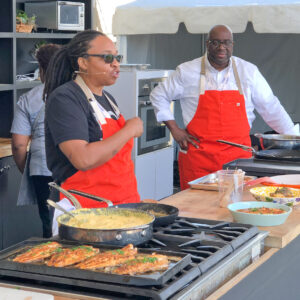
Tia Clark of Casual Crabbing with Tia shares the story of learning to cook Geechee fare from her grandmother during the Seafood Throwdown at Charleston Wine + Food in March 2023.
We also hosted two Slow Fish Chefs Camps (in Philly and New Orleans), bringing chefs from the area to meet with local fishermen to talk about building direct relationships and shifting local seafood systems. Chefs had the opportunity to talk about what they want to see coming in the door. Fishermen talked about challenges they face from shifting policies, climates and markets, and what they can offer local chefs based on seasonality and regulations. We built new relationships, we committed to sourcing sustainably, and in New Orleans, we discussed how a new, fishermen-led local processing facility might support local fishermen and local seafood systems.
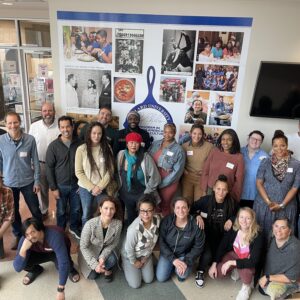
Slow Fish Chefs Camp at Dillard University in New Orleans in November 2023. Photo: Kevell Byrd
Into the future
We’ve made some great strides in nine years and we’ve learned some valuable lessons. We’ve forged powerful partnerships and built a reputation for curating sustainable seafood conversations that are dynamic, informative and engaging.
In the near term, we are co-emceeing a Seafood Throwdown at Boston Jerkfest for the second year in a row (with One Fish Foundation Board Member Brett Tolley) this Saturday, July 13. We’re planning a Chefs Camp in Oakland on August 6 with Slow Fish North America, Slow Food USA and Slow Food East Bay. We’ll be highlighting our Rising Tide work in a presentation before the Slow Fish General Assembly during Slow Food Terra Madre (30,000+ visitors from around the world) in September. And we’re deep in the planning for Slow Fish 2024: Charleston (S.C. from November 1-3) convening fisherfolk, fishmongers, retailers, chefs, educators and more from across the continent and beyond.
For the long term, we will continue to bring more folks into the conversation about seafood with values by broadening our reach to more students, more chefs, more fishermen, more fishmongers, more researchers, etc. We’ll double the number of students we empower in five years, and host more community events.
And we’ll continue to shift the seafood supply chain toward a more equitable, just, and values-based system, one “fish” conversation at a time.
Much of the credit for these achievements goes to all of the fisherfolk, teachers, fishmongers, chefs, allies, friends and community folks from near and far who have supported One Fish Foundation in various ways over the years. Heartfelt thanks!
So I have two asks for the One Fish Foundation community:
- Please share this with at least one teacher you know. The more students we reach, the better chances of affecting real change in local seafood supply chains.
- Consider a donation to our small non-profit to help us grow and fulfill our mission.
Stay tuned!
Top photo: Students at Lyman Moore Middle School in Portland, ME, consider different options for protecting North Atlantic Right Whales while also supporting Maine’s vital lobster industry during a Spring 2024 class.


